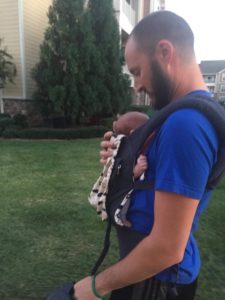By Denise Rangel Holbrook IBCLC
Preparing for a baby is fun. Your belly grows and your mind wanders to the unknown; all of the infinite possibilities.You roam the store to handpick items for your registry choosing pieces that fit the image of what your picture perfect family looks like.You choose the perfect name, the perfect crib, and the even more perfect bed set. You plan the perfect baby shower. A birth team is chosen to honor and support you. You love your Birth Doula and took so much out of the birth and breastfeeding classes you attended.

But once the baby arrives and the initial excitement has passed, you are often left alone with a tiny little being that is now solely your responsibility. You prepared for the baby, but what came next did not make it into the narrative you wrote for yourself: the sore nipples, the lack of sleep, the overwhelming feelings of inadequacy. The fourth trimester consists of the first few months after a baby is born where it is transitioning and adjusting to life outside the womb. Though it’s true that for some this transition is seamless, it is also true that for many this transition can be overwhelming and full of challenges. Our baby’s birth is not the end of our journey, but the beginning of something new. Of someone new. Your new life as a parent and your baby’s new life earthside.
Preparing and Surviving the Fourth Trimester

Real Talk
First, it is important to understand and accept that babies are a full time job, especially in the first few weeks. Newborn babies want and need to be close to you. Plan to spend at least the first two weeks in bed with your baby giving them lots of skin to skin, nursing them on demand, and bonding with them. Commit to this idea now, and it will not feel like such a shock when the baby arrives.
Identify Your Helpers, Give Them Jobs They Can Succeed In
Is your mom great at making a few meals, freezing them for later all while putting up laundry and doing dishes? Great! This is the perfect job for her. Is she not so great at sitting with you and really hearing you and your struggles? Let’s give that job to someone else. Be honest with yourself about who in your life can be with you and really help during what can be a very difficult transition. Create a list and reach out to them before the baby comes so they can be prepared to be called upon, when needed.
Hire a Postpartum Doula
Postpartum Doulas are trained to help nurture the family as they transition into parenthood. They offer guidance and help with the physical and emotional recovery after birth and provide breastfeeding support, assistance with newborn care, and more. Find a doula while you are pregnant, interview them to make sure their values align with yours, and add them to your postpartum team. To find a doula close to you visit www.doulamatch.net.
Find Local Support Groups
Ask your midwife, doctor, doula, childbirth educator, and friends which support groups they recommend, and make an effort to go to a meeting while you are pregnant. What you will find at a support group is a collection of parents who have been through, or are currently going through, similar struggles. Online support groups can be a helpful, but be can also be full of negativity and judgement, so join with caution.
Rethink the Registry
What do babies really need? Think about it: Is it the cute onesie with the matching leggings and tiny jacket? Does your baby really need tiny pockets? Think over all the advice you just read and apply it to your registry. Ask for practical help and gifts like a gift certificate for a postpartum doula or lactation consultant. Ask people if they are available to help when the baby comes, and how they can assist you. Meal delivery, grocery shopping, and chores are gifts you can ask for ahead of time. Just be sure to mention that an offer to help is not a guarantee to see the baby.
For Partners

For non birthing/breastfeeding partners, it is easy to feel confused as to what your role is. Put simply, your role is to support the process and help nurture your family. Go to the birth and breastfeeding classes too, and learn as much as you can about what normal birth and breastfeeding looks like. Change diapers, get lots of skin to skin with baby, and make sure your breastfeeding partner is well nourished and hydrated. Be the gatekeeper of your home and only let supportive, compassionate people in with your family during this delicate time.
Finally, know that although parenting is not easy, it will get better. You get better. Transition and the unknown/uncertainty are always the hardest. It is through experience and going through the fire, the unknown, that we build our confidence as parents.All we can do is plan as best as we can for a smooth transition. Will you feel like your old self again? Maybe. But maybe not. And that is OK. You are not the same. You are stronger. But you are not alone.

